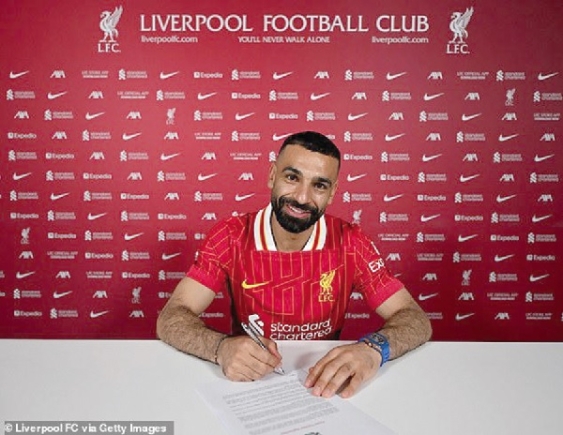
Inside Mo Salah's £1m-a-week Liverpool deal that redefined loyalty
By the time Liverpool unveiled the news with a cheeky tweet, the drama had long reached fever pitch behind closed doors.
At 8 a.m. last Friday, Liverpool’s social media blared the words: “More in than out”. A light-hearted jab at Mohamed Salah’s own confession months earlier when, amid swirling uncertainty over his future, he admitted feeling “more out than in” at Anfield.
Fast forward to April 2025, the Egyptian superstar has now committed to two more years on Merseyside — a deal that keeps him at Liverpool well into his 34th year, with no release clauses or break options.
But this wasn’t just another contract extension — it was a masterclass in negotiation, risk management and strategic vision. In a story blending legal acumen, executive diplomacy and high-stakes brinkmanship, Salah’s team outmanoeuvred aggressive Saudi interest, while Liverpool’s leadership played a long game that preserved financial discipline and retained a global brand ambassador.
For business leaders watching from the sidelines, this saga offers rich insights into corporate negotiations and talent retention strategies under pressure.
Tempting Saudi offer
At the heart of the saga was growing interest from Saudi Arabian clubs, eager to make Salah the poster boy of their football revolution. Lucrative offers were whispered across corridors of power, reportedly dwarfing the Premier League’s top wages. With the Public Investment Fund-backed league flexing its financial muscle, many believed Salah might follow the path of global stars to Riyadh or Jeddah.
But Salah’s decision not to jump ship wasn’t based solely on money. His inner circle, led by the sharp-witted lawyer and long-time advisor Ramy Abbas, played a pivotal role. They were open to listening — but not easily swayed. The message from Abbas was clear: Salah still had goals to chase, records to break and a Ballon d’Or to win. At 32, he wasn’t ready to fade into semi-retirement.
What clinched the decision to stay at Liverpool? Respect, legacy and an organisation willing to match ambition with substance.
Legal precision and loyalty
Colombian-born Abbas, Salah’s formidable lawyer and trusted confidant, is known in elite football circles for being efficient, direct and fiercely protective of his client. He doesn't entertain lengthy phone calls — especially not in the UAE, where WhatsApp calls are blocked. Messages go unanswered unless it’s serious.
His WhatsApp profile even reads: “Voice notes ignored. If you’re late, I will leave.”
It was Abbas who shaped the contours of the new deal, negotiating not just from a place of loyalty, but from calculated leverage.
When Liverpool’s new sporting director, Richard Hughes, initiated talks last July, Abbas was cautious. The personal touch — a rare commodity in elite football negotiations — was revived when Hughes travelled to Dubai not once but twice before the end of 2024.
Their first face-to-face meeting was over drinks at a quiet bar — a casual setting for a crucial conversation. But Abbas left with doubts. Was Liverpool still serious about Salah? Would they recognise his sustained excellence and reward him accordingly?
Abbas knew his client’s worth. More importantly, he knew Liverpool couldn’t replace what Salah offers — not just on the pitch, but commercially.
A global Muslim icon, Salah is a brand unto himself. That level of influence doesn’t come cheaply.
Liverpool's strategic patience
Back in Liverpool, Hughes faced pressure. The club was navigating a transition after the departure of Jurgen Klopp and the appointment of Feyenoord’s Arne Slot. Salah wasn’t the only player with a contract running down — club captain Virgil van Dijk and deputy Trent Alexander-Arnold were in the same boat. Yet, Hughes knew Salah was the linchpin.
Guided by Fenway Sports Group’s (FSG) mantra — “Don’t ask what looks right today; ask what will look right in three years” — Hughes trod carefully. FSG didn’t want to disrupt their sustainable financial model, but they were also aware that Salah was not just a player — he was Liverpool’s most valuable asset.
Even with Salah’s previous contract already placing him among the Premier League’s highest earners (reportedly worth up to £1 million per week, including bonuses and commercial income), FSG remained open to matching that structure again — provided the deal made financial sense.
Hughes’ discreet collaboration with former sporting director Michael Edwards, now operating within FSG’s broader structure, helped keep the process on track. Edwards, known for his shrewdness, had orchestrated Salah’s last renewal in 2022. His fingerprints were likely on this one too — if not officially, then certainly in the strategy.
Final deal
The result? A two-year extension, with no release clause, that sees Salah remain the second-highest-paid player in the league behind Erling Haaland. The exact financials remain confidential, but insiders say the package aligns closely with his previous terms, including rich commercial opportunities and performance-linked incentives.
Perhaps, more importantly, it restores clarity and calm for Liverpool. With Salah’s future secured, the club can now focus on rebuilding under Slot, knowing that their biggest icon — a man with 243 goals in 394 appearances — remains at the helm.
For Salah, the twilight of his career isn’t a slow descent. It’s a reinvention.
Boardroom lessons
This deal wasn’t just about football. It was a strategic chess match with lessons for corporate leaders across sectors:
Know your asset: Liverpool recognised Salah’s unique value — commercially, culturally and competitively. They didn't let age dictate worth.
Negotiate with respect: Abbas valued face-to-face engagement. Personal touches still matter in high-stakes deals.
Patience pays off: Saudi Arabia’s interest was real. But Salah’s team didn’t let the numbers alone dictate the narrative. Legacy won the day.
Sustainable vision matters: FSG’s insistence on long-term thinking ensured that emotion didn’t override financial strategy.
In the end, Egyptian icon Salah stays — not just as a footballer, but as a case study in leadership, loyalty and the power of smart negotiation.
For Liverpool, it’s not just “more in than out” — it’s a decisive win in a high-stakes business play. (Adapted from The Athletic)